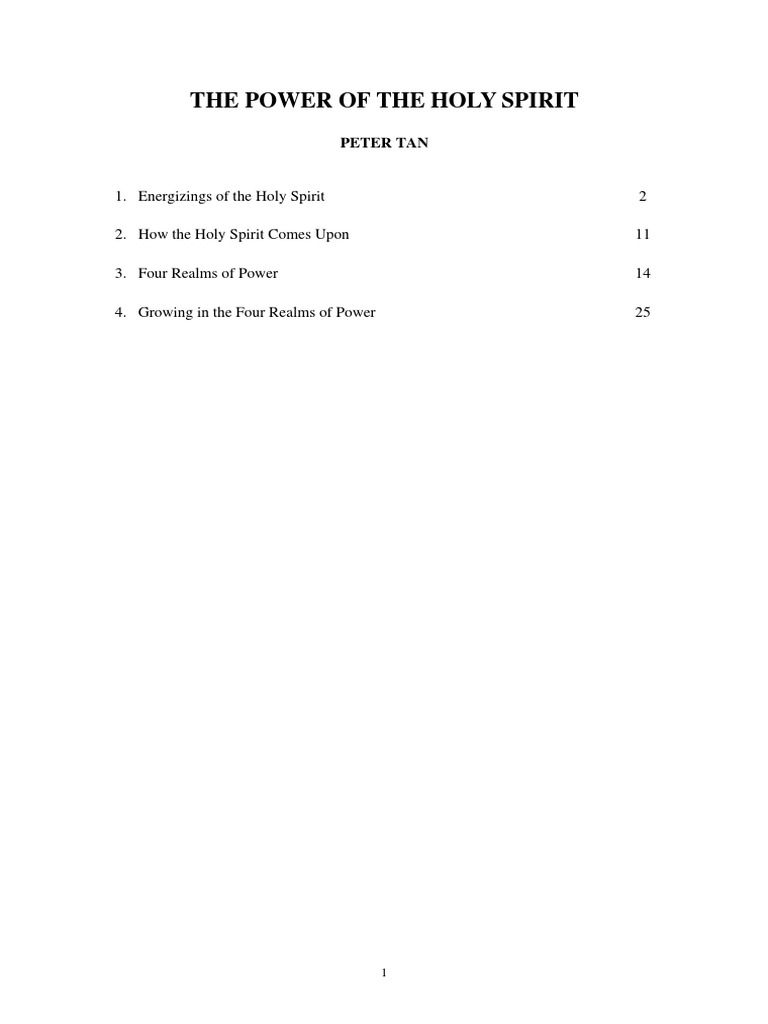The Bahá’í Faith, with its profound and multifaceted approach to spiritual enlightenment, places tremendous importance on the concept of the power of the Holy Spirit. This principle serves as a cornerstone for understanding the dynamics of divine influence and illumination within human existence. What does it truly mean for believers to access this transcendent energy, and how does it interact with the fabric of human potential and spiritual growth? This inquiry beckons not only intellectual curiosity but also challenges individuals to reflect deeply on their own spiritual journeys.
At the core of Bahá’í teachings lies the understanding that the Holy Spirit, often referred to as the ‘Holy Spirit of God,’ is a divine force that empowers humanity to engage with the bounty of divine attributes. It facilitates the connection between the Creator and creation, enabling individuals to transcend their limitations and align with higher realities. This divine power is not a distant, abstract notion; rather, it suffuses all aspects of life, nurturing spiritual capacities and manifesting as a catalyst for personal and communal transformation.
Exploring the essence of the Holy Spirit within Bahá’í thought requires an appreciation of its role in various stages of human development. The initial stage involves the awakening of the soul—a prelude to engaging with divine teachings. This awakening is often characterized by a gradual recognition of one’s own potential, seemingly mundane at first. But, as energy from the Holy Spirit flows through the individual, a quest for deeper understanding emerges. This transformative process leads to the actualization of latent abilities, thereby fostering a connection with the broader universe.
As individuals delve deeper into their spiritual aspirations, the concept of divine assistance becomes crucial. In Bahá’í belief, the Holy Spirit provides guidance, inspiration, and clarity. An interesting challenge surfaces: how can a believer cultivate receptivity to this divine influence? The answer lies in the practice of prayer and reflection, which act as conduits for the Holy Spirit’s power. Engaging in prayer helps to purify the heart and mind, aligning them with divine will and opening the soul to receiving heavenly revelations.
Furthermore, the role of the Holy Spirit is paramount during moments of communal worship and collective endeavor. When individuals gather in the pursuit of unity and shared purpose, the manifestation of the Holy Spirit can be particularly potent. The collective consciousness becomes a resonant space where individual desires merge into a singular aspiration for higher truths. Herein lies another playful question: how might communities overcome discord and division to tap into this shared divine energy? The answer is steeped in the principles of love, service, and collaboration that underpin Bahá’í social teachings. By fostering an environment of mutual respect and understanding, individuals can unite their intentions, thereby amplifying the effect of the Holy Spirit among them.
Additionally, the Bahá’í perspective posits that the Holy Spirit is not merely a passive force. Instead, it actively cultivates virtues essential for personal and community development. These virtues include compassion, justice, and humility. The power of the Holy Spirit manifests in individuals as they strive to embody these attributes in daily life. The idea that one’s personal transformation contributes to the collective advancement of society is a significant tenet of Bahá’í teachings, introducing the notion that spiritual awakening is intrinsically linked to societal progress.
This interconnectedness raises yet another challenging question: Is individual spiritual fulfillment indicative of a healthy community, or does a thriving collective foster individual growth? This dialectic is vital in Bahá’í thought. The two are not mutually exclusive; rather, they operate in a synergistic relationship. Each individual’s journey towards realizing the power of the Holy Spirit enhances not only their own life but also enriches the lives of others. In this regard, the Holy Spirit serves as a bridge between personal and communal aspirations.
As we contemplate the transformative potential of the Holy Spirit, the Bahá’í Faith emphasizes the necessity of harnessing this divine energy for the betterment of humanity at large. The principle extends beyond individual enlightenment to encompass global responsibilities. The challenge posed here is significant: how can individuals and communities align their actions with the higher faculties imparted by the Holy Spirit to address pressing societal issues? The Bahá’í teachings suggest that by integrating spiritual principles into everyday life, believers can become agents of change, using the power of the Holy Spirit to influence their environments positively.
In closing, the principle of the power of the Holy Spirit encapsulates a dynamic interplay between divine influence and human endeavor. From personal enlightenment to collective empowerment, the implications of this principle permeate all levels of existence, urging believers to continually seek deeper connections with both their inner selves and the broader world. The interplay between individual aspirations and collective growth invites reflection on how humanity can thrive under the guiding light of the Holy Spirit. Ultimately, embracing this principle encourages a journey that transcends the self, fostering a harmonious relationship between the divine and the earthly realm.
